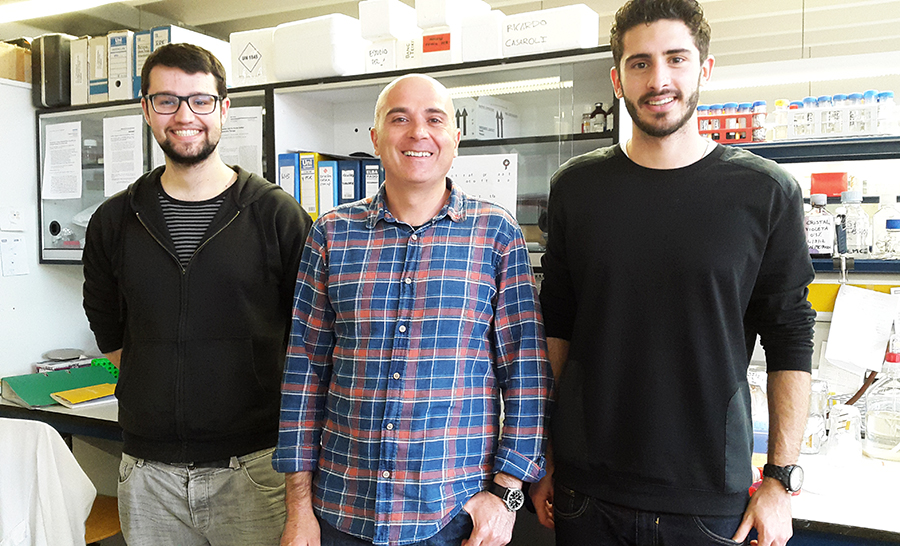
FRANCESC X. SORIANO
Position: Associate professor
Research team
Marc Segarra Mondejar
Early stage researcher
segarramon (at) ub.edu
Sergi Casellas Diaz
Early stage researcher
scasellas (at) ub.edu
Contact details
Dr. Francesc X. Soriano
Department of Cell Biology, Physiology and Immunology
Faculty of Biology, Av. Diagonal 643
08028 Barcelona (Spain)
934029046
f.x.soriano (at) ub.edu
Research Interests
The understanding of the molecular events that determine neuronal death or survival is essential to look for possible therapies against neurodegeneration. The research in the group focus on understanding the signaling events that impact on neuronal viability.
Neurodegenerative diseases are a heterogonous group of disorders characterized by progressive neuronal death. Despite this heterogeneity, mitochondria involvement is common in these diseases. Mitochondria are dynamic organelles that constantly fuse and divide, changing shape and localization. The equilibrium between fission and fusion is important for mitochondrial function and therefore, for neuronal viability. We study the mechanisms by which neuronal viability is affected by changes in mitochondrial dynamics and how pro-death events modify mitochondrial dynamics.
Neurodegenetation occurs when pro-death pathways are more intense than pro-survival ones. Thus, a complementary anti-neurodegenerative strategy is to enhance pro-survival pathways. Physiological synaptic activity is strongly neuroprotective, the basis which is not completely understood. Synaptic activity induces signaling pathways which activate post-translational modifications as well as activating new gene expression. We aim to understand the signaling events triggered by synaptic activity and their impact in neuronal viability.
Current Research Lines
- Mitochondrial dynamics in neurodegeneration
- Neuronal metabolism and neuroprotection
Highlighted publications
·Segarra-Mondejar M, Casellas-Díaz S, Ramiro-Pareta M, Müler-Sánchez C, Martorell-Riera A, Hermelo I, Reina M, Aragonés J, Martínez-Estrada OM, Soriano FX. Synaptic activity-induced glycolysis facilitates membrane lipid provision and neurite outgrowth. EMBO J. 2018. May 2, 37(9). pii: e97368
·Martorell-Riera A, Segarra-Mondejar M, Reina M, Martínez-Estrada OM, Soriano FX. (2015). Mitochondrial fragmentation in excitotoxicity requires ROCK activation. Cell Cycle 14 (9): 1365-9.
· Martorell-Riera A., Segarra-Mondejar M., Muñoz J.P., Ginet V., Olloquequi J., Pérez-Clausell J., Palacín M., Reina M, Puyal J, Zorzano A, Soriano FX. (2014). Mfn2 downregulation in excitotoxicity causes mitochondrial dysfunction and delayed neuronal death. EMBO J. 33(20): 2388-407.
· Soriano FX, Martel MA, Papadia S, Vaslin A, Baxter P, Rickman C, Forder J, Tymianski M, Duncan R, Aarts M, Clarke P, Wyllie DJ, Hardingham GE. (2008). Specific targeting of pro-death NMDA receptor signals with differing reliance on the NR2B PDZ ligand. J. Neurosci. 28(42):10696-710.
· Papadia S, Soriano FX*, Léveillé F, Martel MA, Dakin KA, Hansen HH, Kaindl A, Sifringer M, Fowler J, Stefovska V, McKenzie G, Craigon M, Corriveau R, Ghazal P, Horsburgh K, Yankner BA, Wyllie DJ, Ikonomidou C, Hardingham GE. (2008). Synaptic NMDA receptor activity boosts intrinsic antioxidant defences. Nat. Neurosci., 11(4):476-87 * Joint first author.



